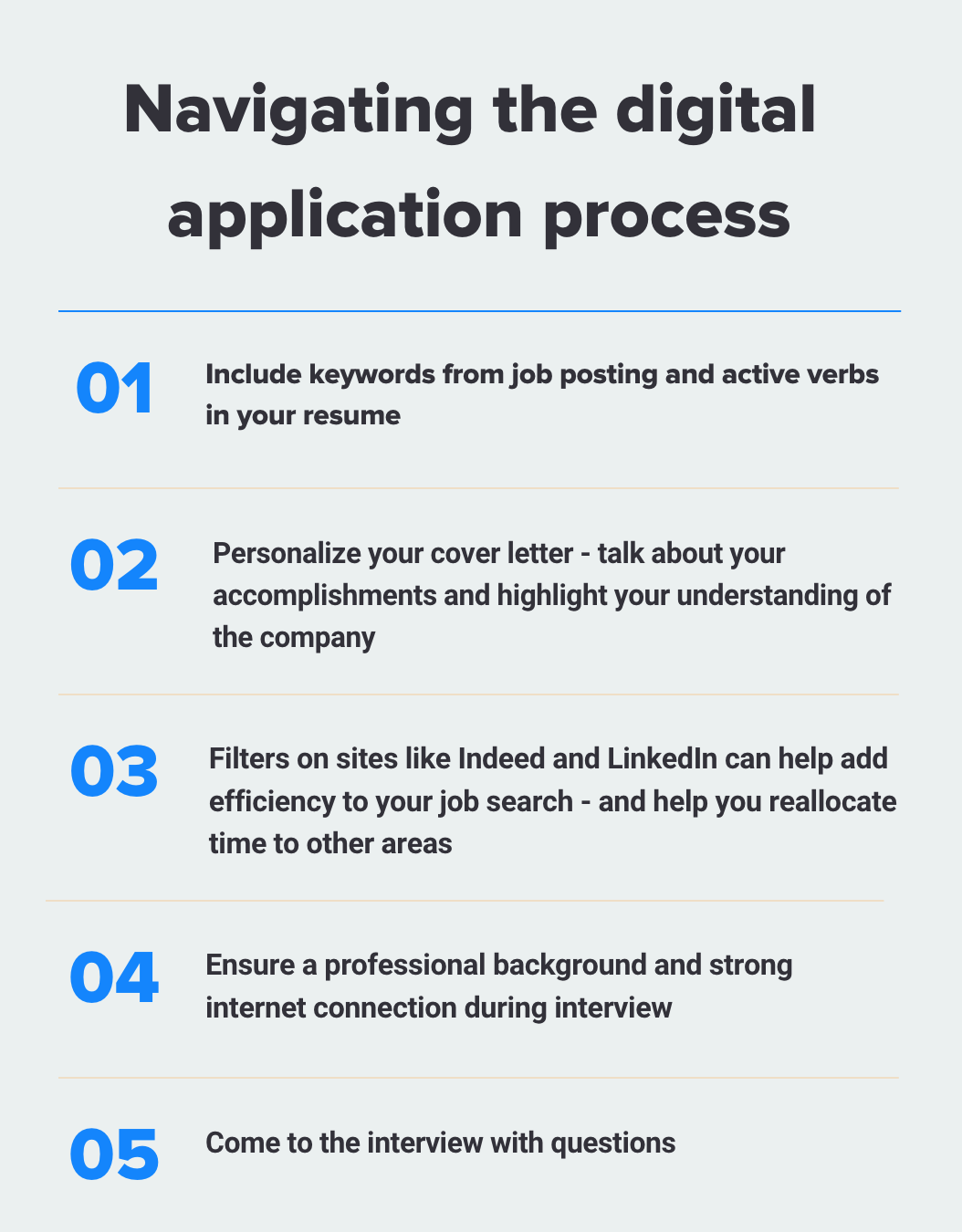Searching for a new job can be stressful. From searching for jobs you are interested in and qualified for, and writing countless cover letters, to preparing for an interview with an intimidating manager, the entire process of acquiring a job can be exhausting and time-consuming.
To many, job-searching can feel like a part-time job that you have to manage on top of your current job, course work or family obligations. The worst part? You could spend all this time perfecting an application and then never hear anything back.
Although no one is immune to rejection or ghosting, there are things you can do to make your chances of scoring an interview and receiving a job offer much higher.
Here is everything you need to know for each stage of the job searching process.
How do I stand out on my resume?
Writing a resume that shows off your skills and qualifications in a concise manner is its own art form that often takes multiple drafts to nail. Here are some of the most important resume tips you should follow:
Include keywords – When you are searching for jobs online, note the keywords the job listing includes in their requirements section. Use those words throughout your resume so that you stand out quickly as being a qualified candidate.
Update your resume for different jobs – A resume is not one-size-fits-all. When you are applying for a job, make sure your resume best represents your qualifications for that particular job. You might want to change the order of your sections, use different wording to highlight a different skill or even swap out information for more relevant past experiences. If you are applying for a few different job industries, you may want to create a separate resume for each industry. Then, build off whatever resume is most relevant for the current job you are applying for.
Use active verbs – Start each sentence of your resume with a verb that demonstrates your action best. For instance, instead of saying “worked as a mentor,” say “mentored” at the beginning of your sentence. Verbs like “create, lead, initiate, produce, organize, orchestrate and teach” are good examples of active verbs.
Follow standard formatting guidelines – Your resume should be no more than a page and easy to read. Additionally, each section should be in chronological order with your most recent experience at the top of the section. Put your most important sections at the top. Common sections include:
Education
Skills/achievements
Work experience
If you are in college or high school you may include relevant coursework, internships and academic achievements.
What should I say in my cover letter?
Although not always, most jobs also require you to write a cover letter. Keep these tips in mind when you are writing your letters:
Don’t be afraid to brag about yourself – Your cover letter is the time to dive deeper into the main ways your skills and experience would benefit the company. Give anecdotal examples of your unique abilities and always tie these examples back to how they would specifically serve the company you are applying to.
Show your understanding of the company – Although your main focus of a cover letter is to showcase your qualifications, also make sure you explain why you want to work specifically for that company. In the first paragraph, provide a sentence or two explaining what you think the company does better than anyone else. Do your research here! A deep level of understanding about the company can really help you distinguish yourself.
Don’t submit a generic cover letter – Your first and last paragraphs should be almost entirely personalized to a specific company. In the middle paragraphs, you can recycle examples of your qualifications and experiences. Just make sure your examples are relevant to the position you are applying for. A helpful tip is every time you write a new section about your qualifications, add the generic parts of the paragraph (everything except what is tailored to a specific company) into a separate document so that you have all of your examples in one place, making it easy to pull from for future cover letters.
Address the letter to a specific person, if you can – To make your cover letter more personal and show you did your research, try to find out who reads the applications and address it to that person. Often the company will tell you how to address the letter in the job posting, so make sure you don’t miss that. If you can’t find a person to address the letter to, say “To whom it may concern.”
Follow standard formatting guidelines – Just like your resume, you will want to keep your cover letter under one page. Cover letters are typically three to five paragraphs, depending on the length of each paragraph. Your cover letter should take a business-like tone and should be written in complete sentences with no slang, emoticons or acronyms.
How do I find jobs?
Look for jobs on career websites – The best way to find jobs is to search for jobs on career websites. The best websites include:
Indeed: For finding the most number of jobs listed
LinkedIn: For finding jobs where you have connections and for providing helpful job filters
Scouted: For recent college graduates
AngelList: For finding startup listings
LinkUp: Good for finding up-to-date listings
Use the filter feature: You can’t possibly sort through all jobs listed. In order to make your search as efficient as possible, include as many filters as you can. Some of the best ones to use, if available, include location, experience level and job type (internship, part-time, full-time). If you don’t have a keyword for a job title, you may also want to use the industry, job type and job function filters.
Network – A major aspect of the job searching process, and arguably the most important aspect, is networking. It is essential that you reach out to people with experiences you are hoping to gain and to people who are working at the companies you want to apply for. The best place to start is to apply to companies that contain employees you know or who went to your college. Before applying for the job, reach out to those contacts and ask to chat briefly on the phone about their experience working for the company and any advice they might have. Reaching out to people in your social circle and alumni is useful because they are more likely to respond than total strangers. Not only could these contacts help give you a sense of what to say in your cover letter or how to stand out on your resume, but they may even put you in touch with the recruiters or push your resume to the top of the list. That can make all the difference. The best way to find contacts is through LinkedIn. However, your friends, family and college career center may also have a list of contacts to reach out to as well. One of the greatest values of college is the network you inherit. Use it!
How should I prepare for my interview?
Zoom interviews have become an increasingly common part of the job searching process. With the coronavirus pandemic, Zoom interviews are practically guaranteed now. Although the interview itself is no different online as it is in-person, there are some additional elements you should keep in mind.
Here’s how to have a successful Zoom interview:
Choose a professional background – Be cognizant of what is in the background during your Zoom call. You will want to avoid any distracting images or movement in the background. This means keeping your background as generic as possible. Additionally, make sure that any part of the room that appears on your screen is tidy and organized. You don’t want your interviewer to be distracted by your unmade bed or by clothes on the ground!
Limit background noises – Although construction and outside noises are out of your control, try to prevent as many background noises as you can. It is often helpful to warn the people around you that you will be in an interview and to silence your cellphone and turn off all notifications on your computer.
Charge your computer – The last thing you want is to be in the middle of an interview and your computer dies on you. Have your charger plugged into your computer during the interview, if possible.
Find a good internet connection – In order to avoid any glitching or freezing during your Zoom call, make sure you have a strong internet connection. You will want anywhere between 225 to 670 Kbps for a Zoom call. If your internet plan has data caps, be aware that an hour-long Zoom call will use 810 to 2.4 GB of data.
General interview tips
Regardless of whether you are meeting in-person or over a Zoom call, you will want to keep in mind the following tips:
Be professional – This includes wearing professional attire, using appropriate body language, smiling and arriving on time to the interview.
Prepare your answers ahead of time – Not only should you prepare your answers to common interview questions, but you should also do some research and find out what kind of questions you might expect from this specific company. Glassdoor is a good place to look for information on other people’s interview experience at that company and to learn what questions they were asked. Go through those questions and make sure you have an answer. Another helpful tip is to come up with a couple of anecdotes that best highlight your strengths and qualifications and could be applied to a number of questions.
Come with questions – At the end of the interview, you will be asked if you have any questions. This is the time to learn more about the company and what your role might look like. The interview process is not only a time for the company to evaluate you but also for you to evaluate the company and decide if it’s a good fit.
Send a follow-up email – Send a thank you email no more than 48 hours after your interview. Write in complete sentences and speak in a business-like manner. However, try to keep the email brief as someone may not read the email at all if it’s too long. To help you write a meaningful follow-up email, take notes directly after your interview so you remember what you talked about. Refer to those notes when writing your thank you email so it is personalized. Make sure to send a separate and unique email to each person who interviewed you.





